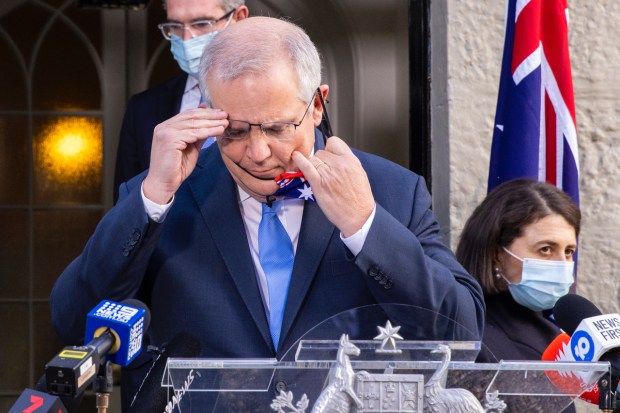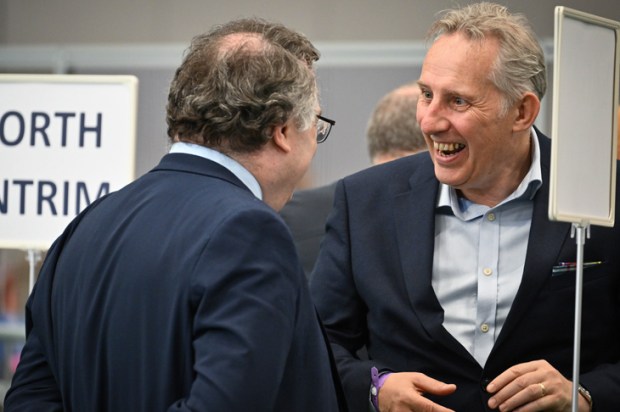On 24 October, Jay Bhattacharya, once derided by Anthony ‘Mr Science’ Fauci as a fringe epidemiologist, was awarded the Zimmer Medal for Intellectual Freedom by the American Academy of Sciences and Letters. The medal ‘is presented annually to a public thinker who displays extraordinary courage in the exercise of intellectual freedom’. The 2023 winner was Salman Rushdie. Jay’s citation recognises his ‘courage and firm commitment to intellectual freedom’ and that he ‘resolutely refused… to compromise his scientific findings’ and took ‘a stand for the public’s right to unrestricted scientific discussion and debate’. His writings and speeches are powerful examples of passion, courage and clarity of expression that reflects clear thinking. He toured Australia in 2022 and James Allan and I had the honour to share a packed townhall meeting with him (viewable online) in Melbourne in September 2022, and Rowan Dean likewise in Sydney. Sadly but not surprisingly, his tour was mostly ignored by Australia’s mainstream media.
On 29 October 2024, the official panel inquiring into Australia’s Covid-19 response submitted its 353,000-word report. It opens with genuflections to political correctness: an irrelevant acknowledgment of country and lived experience (‘We acknowledge that Covid-19 touched every person, every organisation and each sector in different ways’ – you don’t say); and content warning (in a report on Covid!). This is followed by turgid writing and bureaucratic analysis and recommendations. The Great Barrington Declaration of October 2020, co-authored by Bhattacharya, is still better big-picture value in both language and content and it might even profit PM Anthony Albanese to read its one page of 513 words, perhaps while sipping the bubbly in an upgraded first class cabin en route to a family holiday in Europe. At the granular level, the report has some positive features but these are outweighed by flaws of commission and omission, much like the response to the pandemic itself. Astonishingly, the words ‘cost-benefit analysis’ do not appear.‘Trade-off’ gets four mentions.
The report confirms that lockdowns, state border closures, school shutdowns and vaccine mandates broke public trust in governments and science. They drove lower Covid vaccine take-up in the last two years and promoted cross-vaccine hesitancy. So did inconsistent advice, recommendations and enforcement practices across the states, compounded by the refusal to release health advice and its science and evidence base. The strong emphasis on human rights and the wider economic, social and mental health consequences of the pandemic policies is also welcome. So too discussion of the long-term damage to children’s learning, development and emotional health, effectively punishing kids to protect the adults. All this is good, but neither new nor insightful. Several of us warned about precisely these downstream consequences in the pages of this courageous magazine from the start.
It’s also simply not good enough. The report ignores how Australia’s Covid response marked a radical departure from the prevailing consensus on science and policy as synthesised in the WHO September 2019 report. There is no clarity on why our own existing pandemic preparedness plans were ditched. Nor does the report explore the culture cringe whereby Australian health authorities mimicked American and British counterparts on made-up measures like the two metre social distancing, or why the regulators accepted results from the vaccine manufacturers’ own trial results conducted overseas instead of requiring them to be done locally to our standards and satisfaction.
Critical flaws of commissions begin with paeans to leaders’ courageous decision-making in conditions of mass fear and extreme uncertainty. The fear and hysteria did not match the data yet the government and media fed it. Experts who called for calm and responses proportionate to risks were ignored, censored and vilified. Early data, including from the Diamond Princess cruise ship in February 2020, confirmed that the risk from Covid was highly age-correlated and concentrated in the elderly. There was no reason to strip peoples and businesses of their liberties and freedoms, to put healthy populations under wholesale house arrest, treating them as germ-ridden criminals even if proven innocent.
Far from courageous, the leaders were cowardly and hypocritical. They had no skin in the game, suffered no financial penalty while decimating small businesses, paid no political penalty, got sugar highs on power tripping, hid behind health officials and typically exempted themselves from inconvenient restrictions they foisted on all others. Australia became fixated on the single, dubious metric of case numbers, exaggerating the Covid risks, downplaying the harms of interventions, heightening the fear, stripping people of rights and liberties, censoring dissent and cancelling critics. Regulators became vaccine enablers, more committed to defend vaccines from criticism than to protect people from harms.
The assumption of world-leading performance by Australia is rooted in simplistic and inappropriate European and North American benchmarks against which to assess our outcomes. Our southern hemisphere location, island identity, plentiful sunshine and open spaces, love of outdoors activities, relative paucity of high-density housing, etc. conferred immense advantages in coming through the pandemic with much better outcomes than Europe and America.
The most visible embodiments of courage through the pandemic public policy insanity were Florida Governor Ron Desantis and Sweden’s state epidemiologist Anders Tegnell. Florida and Sweden resisted the lockdown groupthink, are in the mid-range of Covid metrics, avoided most of the health, economic, educational and social damage in European countries and US states with authoritarian approaches, including loss of public trust, and came out better on the balance of benefits versus harms.
Finally, the report vastly underrates public anger and cynicism. People were locked up at home on dubious data and science, forced to isolate from parents and grandchildren, unable to visit grandparents in their final days or attend family reunions, weddings, funerals and birthdays, coerced into taking the shot in order to shop, travel and keep jobs on false assurances of safety and effectiveness. Some of the worst offenders, responsible for the most egregious policies and thuggish enforcement measures, have been awarded the highest gongs going, promoted into governors’ mansions and even promised a statue in their honour. The report’s solution to the overreach and abuse of power by authorities during Covid is to create even more bureaucratic structures with more powers and resources, including an Australian Centre for Disease Control even as the US CDC sinks into ever greater disrepute by the month. Governments grabbed too much power, coming uncomfortably close to becoming police states. Who but the same experts would staff the CDC? It would incense many if those guilty of the biggest assault on Australians’ health, and political and economic freedoms in history were to be rewarded with increased powers and resources to serially indulge their inner bullies.
Dealing with the past is a prerequisite for imposing justified punishment for crimes against the people, enabling closure for the many physical injuries and emotional trauma of the totalitarian responses and deterring future wrongdoers. This report doesn’t take us far on the path we must, but are yet to, travel.
Got something to add? Join the discussion and comment below.
You might disagree with half of it, but you’ll enjoy reading all of it. Try your first month for free, then just $2 a week for the remainder of your first year.













